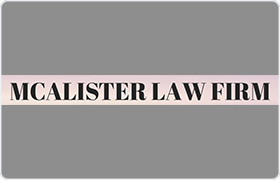Stennis Space Center Adoption Lawyer, Mississippi
Sponsored Law Firm
-
 x
x

Click For More Info:
-
McAlister Law Firm, LLC
419 Security Square Gulfport, MS 39507» view mapDivorce & Family Law Your Gulf Coast Attorney
An Attorney with Nineteen years of court room experience. Licensed in the States of Mississippi and Alabama.
228-265-5190  Carolyn McAlister Gulfport, MS
Carolyn McAlister Gulfport, MSAttorney at Law- MS, 2000
University of Mississippi School of Law, J.D. 2000
AboutMcAlister Law Firm, LLC
Your Gulf Coast Attorney
Practice AreasExpertise
Divorce & Family Law
SPONSORED LAWYERS
1-4 of 4 matches. Page 1 of 1
Rita Nahlik Silin
✓ VERIFIEDDivorce & Family Law, Child Custody, Bankruptcy, Adoption, Paternity
At Silin Law Firm PLLC in Ocean Springs, you will find an attorney with a thorough knowledge of the laws and the courts, along with empathy and honest... (more)
1147 Robinson Street, Ocean Springs, MS 39564
Profile LAWPOINTS™65/100
LAWPOINTS™ measure the overall completeness of a Lawyer's profile. More complete profiles are ranked higher and help visitors select the right lawyer faster.
We help paid Members build more complete and informative profiles.
LAWPOINTS™ do not measure a Lawyer's reputation.
More Info for Lawyers
We help paid Members build more complete and informative profiles.
LAWPOINTS™ do not measure a Lawyer's reputation.
More Info for Lawyers
William A. Pate
Alimony & Spousal Support, Child Support, Adoption, Consumer Bankruptcy
Status: In Good Standing
FREE CONSULTATION
CONTACT 2017 20th Avenue, Gulfport, MS 39501
Profile LAWPOINTS™38/100
LAWPOINTS™ measure the overall completeness of a Lawyer's profile. More complete profiles are ranked higher and help visitors select the right lawyer faster.
We help paid Members build more complete and informative profiles.
LAWPOINTS™ do not measure a Lawyer's reputation.
More Info for Lawyers
We help paid Members build more complete and informative profiles.
LAWPOINTS™ do not measure a Lawyer's reputation.
More Info for Lawyers
Albert Lionel Necaise
Alimony & Spousal Support, Child Support, Adoption, Bad Faith Insurance
Status: In Good Standing Licensed: 61 Years
Gulfport, MS 39502
Profile LAWPOINTS™40/100
LAWPOINTS™ measure the overall completeness of a Lawyer's profile. More complete profiles are ranked higher and help visitors select the right lawyer faster.
We help paid Members build more complete and informative profiles.
LAWPOINTS™ do not measure a Lawyer's reputation.
More Info for Lawyers
We help paid Members build more complete and informative profiles.
LAWPOINTS™ do not measure a Lawyer's reputation.
More Info for Lawyers
Thomas Edward Payne
Admiralty & Maritime, Child Support, Adoption, Criminal
Status: In Good Standing Licensed: 37 Years
Biloxi, MS 39535
Profile LAWPOINTS™30/100
LAWPOINTS™ measure the overall completeness of a Lawyer's profile. More complete profiles are ranked higher and help visitors select the right lawyer faster.
We help paid Members build more complete and informative profiles.
LAWPOINTS™ do not measure a Lawyer's reputation.
More Info for Lawyers
We help paid Members build more complete and informative profiles.
LAWPOINTS™ do not measure a Lawyer's reputation.
More Info for Lawyers
TIPS
Easily find Stennis Space Center Adoption Lawyers and Stennis Space Center Adoption Law Firms. For more attorneys, search all Divorce & Family Law areas including Child Custody, Child Support, Divorce and Family Law attorneys.
LEGAL TERMS
FAMILY COURT
A separate court, or more likely a separate division of the regular state trial court, that considers only cases involving divorce (dissolution of marriage), ch... (more...)
A separate court, or more likely a separate division of the regular state trial court, that considers only cases involving divorce (dissolution of marriage), child custody and support, guardianship, adoption, and other cases having to do with family-related issues, including the issuance of restraining orders in domestic violence cases.
TENANCY BY THE ENTIRETY
A special kind of property ownership that's only for married couples. Both spouses have the right to enjoy the entire property, and when one spouse dies, the su... (more...)
A special kind of property ownership that's only for married couples. Both spouses have the right to enjoy the entire property, and when one spouse dies, the surviving spouse gets title to the property (called a right of survivorship). It is similar to joint tenancy, but it is available in only about half the states.
HEARING
In the trial court context, a legal proceeding (other than a full-scale trial) held before a judge. During a hearing, evidence and arguments are presented in an... (more...)
In the trial court context, a legal proceeding (other than a full-scale trial) held before a judge. During a hearing, evidence and arguments are presented in an effort to resolve a disputed factual or legal issue. Hearings typically, but by no means always, occur prior to trial when a party asks the judge to decide a specific issue--often on an interim basis--such as whether a temporary restraining order or preliminary injunction should be issued, or temporary child custody or child support awarded. In the administrative or agency law context, a hearing is usually a proceeding before an administrative hearing officer or judge representing an agency that has the power to regulate a particular field or oversee a governmental benefit program. For example, the Federal Aviation Board (FAB) has the authority to hold hearings on airline safety, and a state Worker's Compensation Appeals Board has the power to rule on the appeals of people whose applications for benefits have been denied.
EXEMPT PROPERTY
The items of property you are allowed to keep if a creditor wins a lawsuit against you or if you file for Chapter 7 bankruptcy. Most states let you keep clothin... (more...)
The items of property you are allowed to keep if a creditor wins a lawsuit against you or if you file for Chapter 7 bankruptcy. Most states let you keep clothing, household furnishings, an inexpensive car (or an expensive car on which you still owe a bundle), Social Security payments you haven't spent and other basic items. A few states let you keep your house. Following are brief descriptions of specific types of exempt property.animal exemption Allows you to keep animals such as household pets, livestock or poultry. The animal exemption varies among states. If your state simply allows you to exempt 'animals,' you may keep livestock, poultry or pets. Some states exempt only domestic animals, which are usually considered to be livestock and poultry, but not pets.appliance exemption Allows you to keep some of your household equipment operated by electricity, gas or propane. Examples include refrigerators, stoves, washing machines, dishwashers, vacuum cleaners and air conditioners.arms & accouterments exemption Allows you to keep some weapons (such as pistols, rifles or swords) and accouterments, which are the furnishings of a soldier's outfit, such as a belt or pack, but not clothes. A soldier's clothing is his or her uniform.building materials exemption Allows you to keep a certain amount of items needed to build or improve structures, such as lumber, brick, stone, iron, paint and varnish. This exemption is not available in all states.burial exemption Allows you to keep a cemetery plot, crypt, monument or the cash to purchase a burial plot. Some states allow you to claim the burial exemption only if you do not use your state's homestead exemption. States may also limit the amount exempted. This exemption is available in most states.crops exemption Allows you to keep products of the soil or earth that are grown and raised annually and gathered in a single season. For example, oranges (on the tree or harvested) are crops; but an orange tree isn't.farm tools exemption Allows you to keep the tools you use if your primary occupation is farming. Some states limit farm tools of the trade to items which can be held in the hand: hoes, axes, pitchforks, shovels, scythes and the like. In other states, farm tools also include plows, harnesses, mowers, reapers and other larger tools.furnishings exemption Allows you to keep a certain amount of furniture, fixtures in your home (such as a heating unit, furnace or built-in lighting) and other items with which a home is furnished (carpets and drapes, for example).health aids exemption Allows you to keep items needed to maintain your health, such as wheelchairs, crutches, prostheses or hearing aids. States either exempt all heath aids or limit the dollar amount of the total exemption.heirloom exemption Allows you to keep certain items passed from generation to generation which have special monetary or sentimental value.homestead exemption Protects a specified value or specified number of acres in a homestead. The amount you can protect with the exemption varies, depending on the state where you live. A few states have unlimited homestead exemptions, meaning a house worth even many millions of dollars can't be taken by judgment creditors or in Chapter 7 bankruptcy. At the other extreme, a small number of states have no homestead exemption at all.household goods exemption Allows you to keep a certain number of items of a permanent nature (as opposed to items consumed, like food or cosmetics) used in or about the house. It includes linens, dinnerware, utensils, pots and pans and small electronic equipment like radios and toasters. The amount you may keep varies from state to state.implement exemption Protects a certain amount of the instruments, tools or utensils you use to accomplish your job. Some states use this term instead of tools of the trade.in lieu of homestead (or burial) exemption An exemption available in some states only if you don't claim the homestead exemption or burial exemption. The amount of the exemption varies from state to state. It can be the approximate equivalent of the homestead or burial exemption or some amount fixed by state law. It's the same as the wild card exemption.jewelry exemption Protects certain items created for personal adornment; usually includes watches. Expensive jewelry is usually not included, although many states exempt wedding and engagement rings. Most states limit the total jewelry exemption amount, ranging from $250 to $1,000. Another term for jewelry is 'articles of adornment.'motor vehicle exemption Protects a self-propelled vehicle suitable for use on a street or road, such as a car, truck, motorcycle, van or moped, up to a certain value. For example, if your state's motor vehicle exemption is $2,500 (that's about average), your car is worth $10,000 and you still owe $8,000 to your lender, your car is exempt. You have equity of $2,000 ($10,000 - $8,000) and a $2,500 exemption to put toward it. (This assumes you can afford to keep making your car payments. If you can't, your lender will repossess your car and sell it at an auction.) On the other hand, if your vehicle is worth a lot and you don't owe anything on it, you probably won't be able to keep it, because the exemption won't cover the full amount of your equity.musical instrument exemption Allows you to keep certain instruments having the capacity, in and of themselves, when properly operated, to produce a musical sound. Pianos, guitars, drums, drum machines, synthesizers and harmonicas are musical instruments. Spoons (knocked on knees or into each other) and metal garbage can lids (when banged together like cymbals) aren't.property of business partnership exemption Protects business partnership property. Virtually all states allow this exemption if the property has the following characteristics: Each partner has a right to possess the property for partnership purposes, but has no right to possess it for any other purpose without consent of the partners. At a partner's death, his share of the partnership property passes to the surviving partners. The property isn't subject to state non-partnership property laws such as dower, curtesy, spouse's share or intestate succession.tools of the trade exemption Protects items of property needed to perform a line of work. For a mechanic, plumber or carpenter, tools of trade are the implements used to repair, build and install. For a doctor, tools of trade are the items found in the doctor's office and bag. For a clergy person, tools of trade often consist of no more than books. Traditionally, the exemption was limited to items that could be held in the hand. But most states now embrace a broader definition and a debtor may be able to fit many items under a tools of trade exemption. A motor vehicle is rarely considered a tool of the trade, unless it is a necessary part of the job--as it would be for a traveling sales representative--not merely used for commuting.wild card exemption Protects any property you choose, though it's not available in all states. Some states that include this exemption limit it to personal property; while others include real estate as well. Some states offer it only in lieu of homestead (or burial) exemption. In nearly all states that offer it, you can apply the exemption to nonexempt property, such as expensive jewelry or clothes, or use it to increase the amount for an already partially exempt item. For example, if Fergie's state has no specific motor vehicle exemption but does have a wild card exemption, Fergie can use the wild card exemption to put toward her car. If the state has a specific motor vehicle exemption, but the amount is limited, Fergie can use the wild card exemption to increase the exempt amount.
ABANDONMENT (OF A CHILD)
A parent's failure to provide any financial assistance to or communicate with his or her child over a period of time. When this happens, a court may deem the ch... (more...)
A parent's failure to provide any financial assistance to or communicate with his or her child over a period of time. When this happens, a court may deem the child abandoned by that parent and order that person's parental rights terminated. Abandonment also describes situations in which a child is physically abandoned -- for example, left on a doorstep, delivered to a hospital or put in a trash can. Physically abandoned children are usually placed in orphanages and made available for adoption.
HEAD OF HOUSEHOLD
A person who supports and maintains, in one household, one or more people who are closely related to him by blood, marriage or adoption. Under federal income ta... (more...)
A person who supports and maintains, in one household, one or more people who are closely related to him by blood, marriage or adoption. Under federal income tax law, you are eligible for favorable tax treatment as the head of household only if you are unmarried and you manage a household which is the principal residence (for more than half of the year) of dependent children or other dependent relatives. Under bankruptcy homestead and exemption laws, the terms householder and 'head of household' mean the same thing. Examples include a single woman supporting her disabled sister and her own children or a bachelor supporting his parents. Many states consider a single person supporting only himself to be a head of household as well.
MISUNDERSTANDING
A mistake by both spouses in a marriage that can serve as grounds for an annulment. For example, if one spouse went into the marriage wanting children while the... (more...)
A mistake by both spouses in a marriage that can serve as grounds for an annulment. For example, if one spouse went into the marriage wanting children while the other did not, they have a misunderstanding that will be judged serious enough for a court to terminate the marriage.
DISSOLUTION
A term used instead of divorce in some states.
GUARDIANSHIP
A legal relationship created by a court between a guardian and his ward--either a minor child or an incapacitated adult. The guardian has a legal right and duty... (more...)
A legal relationship created by a court between a guardian and his ward--either a minor child or an incapacitated adult. The guardian has a legal right and duty to care for the ward. This may involve making personal decisions on his or her behalf, managing property or both. Guardianships of incapacitated adults are more typically called conservatorships .
SAMPLE LEGAL CASES
Childs v. HANCOCK COUNTY BD. OF SUP'RS
... 6. Subsequently, the Planning Commission unanimously agreed to recommend the adoption
of a C-4 classification. ... The circuit court found,. The record reflects that there was substantial
evidence to support the adoption of the new zoning district. ...
Jenkins v. Jenkins
... living mother; (2) Edward Jenkins, Jr., living father; (3) Glenn Edward Jenkins, living brother;
(4) Linda Faye Jenkins Adams, living sister; (5) Lisa Michelle Jenkins, living sister; (6) John Ellis
Jenkins, living brother; (7) Shirley Rosetta Jenkins, living sister by adoption; and (8 ...
DR. KB v. JG
... DICKINSON. DICKINSON, Justice, for the Court. ¶ 1. A married couple adopted twins born out
of wedlock to JG and KAB [1] JG, who was unaware of the adoption, filed suit to set it aside. ... She
also notified JG of her decision to place the children for adoption on January 24, 2007. ...
FILTER BY:
- Free Consultation
- Male
- Female
- Suspended
PRACTICE AREAS
- Accident & Injury
- Bankruptcy & Debt
- Business
- Civil & Human Rights
- Consumer Rights
- Criminal
- Divorce & Family Law
- Adoption
- -Child Custody
- -Guardianships & Conservatorships
- -Custody & Visitation
- -Child Support
- -Divorce
- -Alimony & Spousal Support
- -Family Law
- -Collaborative Law
- -Domestic Violence & Neglect
- -Paternity
- -Prenuptial Agreements
- Employment
- Environmental Law
- Estate
- Government
- Health Care
- Immigration
- Industry Specialties
- Intellectual Property
- International
- Lawsuit & Dispute
- Mass Torts
- Motor Vehicle
- Real Estate
- Tax
- Other


